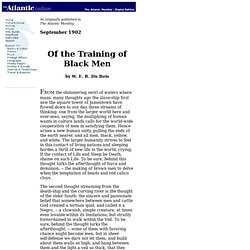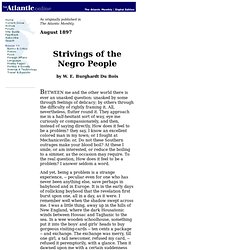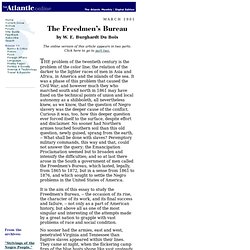

The Case for Reparations. And if thy brother, a Hebrew man, or a Hebrew woman, be sold unto thee, and serve thee six years; then in the seventh year thou shalt let him go free from thee.

And when thou sendest him out free from thee, thou shalt not let him go away empty: thou shalt furnish him liberally out of thy flock, and out of thy floor, and out of thy winepress: of that wherewith the LORD thy God hath blessed thee thou shalt give unto him. And thou shalt remember that thou wast a bondman in the land of Egypt, and the LORD thy God redeemed thee: therefore I command thee this thing today. — Deuteronomy 15: 12–15. Against the Grain: A Program about Politics, Society and Ideas.
BostonSegregation. 100 years of freedom / James Baldwin. <div style="padding:5px; font-size:80%; width:300px; background-color:white; margin-left:auto; margin-right:auto; border:1px dashed gray;"> Internet Archive's<!

--'--> in-browser audio player requires JavaScript to be enabled. It appears your browser does not have it turned on. Please see your browser settings for this feature. </div> pra 20000122 130000restore This audio is part of the collection: Pop Up ArchiveIt also belongs to collection: Community Audio Keywords: Pacifica Radio Archives Individual Files Be the first to write a review Downloaded 60 times Reviews.
Research Projects. NOTE: Due to high traffic overwhelming a Dropbox account, I have shifted the files to another available here: HOLC MAPS.

Here is the current selection of digital HOLC maps I have available. I oversaw the digitization of the majority of these and make them available for public use. In addition, I include a few maps for other cities (also available through ARC, the NARA catalog) that were scanned at medium resolution. These documents were produced by the federal government and are in the public domain, so they can be used by scholars, students, and the general public.
Be sure to give adequate citation of the original sources and this site. Guide to the Ida B. Wells Papers 1884-1976. University of Chicago Library © 2009 University of Chicago Library Descriptive Summary Information on Use Access The collection is open for research.

Digital Images Original documents, texts, and images represented by digital images linked to this finding aid are subject to U. BB0641 James Baldwin: Living and Growing in a White World : Pacifica Radio Archives. <div style="padding:5px; font-size:80%; width:300px; background-color:white; margin-left:auto; margin-right:auto; border:1px dashed gray;"> Internet Archive's<!

--'--> in-browser audio player requires JavaScript to be enabled. It appears your browser does not have it turned on. Please see your browser settings for this feature. </div> James Baldwin How to Cool It - James Baldwin 1968 Trayvon Martin. In Esquire's July 1968 issue, published just after the death of Martin Luther King, Jr., the magazine talked to James Baldwin about the state of race relations in the country.

In light of the Martin Luther King Jr. Day, we've republished the interview in full below. Q. How can we get the black people to cool it? James Baldwin: It is not for us to cool it. Q. James Baldwin: No, we are only the ones who are dying fastest. Q. BALDWIN: That depends on a great many factors. Q. Of the Training of Black Men - 02.09. So here we stand among thoughts of human unity, even through conquest and slavery; the inferiority of black men, even if forced by fraud; a shriek in the night for the freedom of men who themselves are not yet sure of their right to demand it.

This is the tangle of thought and afterthought wherein we are called to solve the problem of training men for life. Strivings of the Negro People - 1897.08. After the Egyptian and Indian, the Greek and Roman, the Teuton and Mongolian, the Negro is a sort of seventh son, born with a veil, and gifted with second-sight in this American world, -- a world which yields him no self-consciousness, but only lets him see himself through the revelation of the other world.

It is a peculiar sensation, this double-consciousness, this sense of always looking at one's self through the eyes of others, of measuring one's soul by the tape of a world that looks on in amused contempt and pity. One feels his two-ness, -- an American, a Negro; two souls, two thoughts, two unreconciled strivings; two warring ideals in one dark body, whose dogged strength alone keeps it from being torn asunder. The history of the American Negro is the history of this strife, -- this longing to attain self-conscious manhood, to merge his double self into a better and truer self. In this merging he wishes neither of the older selves to be lost. The Freedmen's Bureau - 01.03. No sooner had the armies, east and west, penetrated Virginia and Tennessee than fugitive slaves appeared within their lines.

They came at night, when the flickering camp fires of the blue hosts shone like vast unsteady stars along the black horizon: old men, and thin, with gray and tufted hair; women with frightened eyes, dragging whimpering, hungry children; men and girls, stalwart and gaunt, -- a horde of starving vagabonds, homeless, helpless, and pitiable in their dark distress. Two methods of treating these newcomers seemed equally logical to opposite sorts of minds. Said some, "We have nothing to do with slaves. " " Hereafter," commanded Halleck, "no slaves should be allowed to come into your lines at all; if any come without your knowledge, when owners call for them, deliver them.
" Other People's Pathologies - Ta-Nehisi Coates. Over the past week or so, Jonathan Chait and I have enjoyed an ongoing debate over the rhetoric the president employs when addressing African Americans.

Here is my initial installment, Chait's initial rebuttal, my subsequent reply, and Chait's latest riposte. Initially Chait argued that President Obama's habit of speaking about culture before black audiences was laudable because it would "urge positive habits and behavior" that are presumably found especially wanting in the black community.
Chait argued that this lack of sufficient "positive habits and behaviors" stemmed from cultural echoes of past harms, which now exist "independent" of white supremacy. Chait now concedes that this assertion is unsupportable and attempts to recast his original argument: The phrase "culture of poverty" doesn't actually appear in Chait's original argument. That conflation undergirds his latest column. Jonathan Chait’s epic race fail: How a story about racism and Obama goes horribly wrong. I’m glad Jonathan Chait told us that his poorly argued, slightly paranoid New York magazine cover story, “Why Race Has Been the Real Story of Obama’s Presidency All Along,” was written before his epic wrangle with Ta-Nehisi Coates over Paul Ryan and the “culture” of black poverty. Because otherwise, it could only be read as the self-pitying rant of someone who has lost a historically defining argument – someone who has been “sonned,” to use Coates’ term — and is still too hurt to have access to his powers of reason.
Even with the knowledge that Chait’s cover story predates his debate with Coates, I’m not sure what to make of an article that purports to seriously examine the role of race in politics in the age of Barack Obama, and then compares liberals’ claims of conservative racism to McCarthyism (specifically: “the poisonous waft of the debates over communism during the McCarthy years”). See what he did with that “stop-and-frisk” reference? Then what? What would change? Ta-Nehisi Coates - Authors.
On Monday, 66-year old Joan Tarshis accused Bill Cosby of raping her. Tarshis says the attack took place in 1969, when she was 19 and working as comedy writer: ... [H]e told me that he wanted to work on a monologue together, and I had an idea for something about an earthquake that had just happened. It was my first earthquake. Slavery Made America - Ta-Nehisi Coates. Frederick Douglass (Library of Congress) About five years ago, I began a deep dive into the Civil War, most of it chronicled here. That dive culminated in an essay in our commemorative Civil War issue, much like my deep dive on housing and "colorless" policy culminated in The Case for Reparations. The earlier piece built toward the later one. The Case for Reparations: A Narrative Bibliography - Ta-Nehisi Coates. Library of Congress/Wikimedia Commons As I've said before, the idea of reparations precedes this month's cover of The Atlantic, and the work around it—among scholars, activists, and writers—has been ongoing, even if the interest of the broader world is fickle.
Following up on the autopsy of an idea, I thought I'd give some larger sense of how something like this came to be. My hope is to give people who are interested some entrée into further reading, and also to credit the antecedents to my own thinking. Home Is Where the Hatred Is - Ta-Nehisi Coates. A family in its one-room flat in Chicago, date unknown. (AP) In "The Case for Reparations," I tried to move the lens away from the enslaved and focus on their descendants. Narratively, I thought it made a much more compelling read and I it got us past the "but they're all long-dead" argument. Also, once you understand enslavement as central—not ancillary—to American history, you can then easily intuit that it would have some serious effects on policy 100 years later.
The Brian Lehrer Show: - WNYC. Ta-Nehisi Coates on the Country's 'Moral Debt to African-Americans' The Case for Reparations.